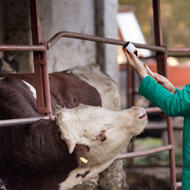New targets set for farm antibiotic use

Good progress has already been made in the industry.
A task force set up by RUMA has published new targets to further reduce the use of antibiotics in livestock.
The news comes as Defra figures show a 27 per cent drop in sales of antibiotics for food-producing animals. This brings veterinary use to 45mg/kg, well below the government target of 50mg/kg, two years ahead of schedule.
Over the past year, targets for eight key sectors have been developed by the Targets Task Force set up by RUMA. The group is comprised of a leading veterinary surgeon and farmer from each of the beef, dairy, egg, fish, game bird, pig, poultry meat and sheep sectors.
Headline targets for the eight sectors are:
Pigs: over a 60 per cent reduction in the use of antibiotics between 2015 and 2020.
Dairy cattle: 20 per cent reduction by 2020, with a focus on halving the use of the highest priority antibiotics that are critically important to human health (CIAs). Strategies will include reducing the use of antibiotic dry cow therapy and injectable products as well as using topical, targeted treatments, rather than group treatments such as antibiotic footpaths for lameness.
Gamebirds: a 25 per cent reduction this year and a further 25 per cent reduction between 2018 and 2020.
Poultry meat, laying hens and fish: these three sectors will focus on maintaining use of antibiotics at the minimal level needed to ensure good health and welfare. The poultry meat sector will maintain current levels in chickens and look for further reductions in turkeys. Clinical governance will ensure CIAs are only prescribed when absolutely necessary.
Trout farming: this sector will concentrate on reducing the need for antibiotics and improving data capture.
Beef and sheep: a 10 per cent reduction by 2020. Both sectors acknowledge they need better data and will commit to addressing ‘hotspots’ in antibiotic use.
As a whole, the targets have been described as “positive and proactive” by the Veterinary Medicines Directorate.
Good progress has already been made in the industry, with antibiotic use in the pig sector falling by 35 per cent between 2015 and 2016. Mark White, president of the Pig Veterinary Society, says the next step is to eliminate routine preventative treatment where it still occurs.
Similarly the poultry meat sector reduced its use of antibiotics by 71 per cent between 2012 and 2016, and has ceased all preventive treatment and use of the highest priority CIAs. The laying hen sector has also eliminated the use of highest priority CIAs in the past two years.
The task force will continue to meet twice-yearly to review progress and discuss issues.



 The Veterinary Medicines Directorate (VMD) is inviting applications from veterinary students to attend a one-week extramural studies (EMS) placement in July 2026.
The Veterinary Medicines Directorate (VMD) is inviting applications from veterinary students to attend a one-week extramural studies (EMS) placement in July 2026.